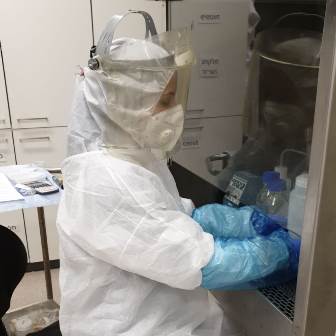BGU has signed an agreement with the Israeli Ministry of Health to detect and monitor SARS-CoV-2, the virus that leads to COVID-19, in sewage samples from 14 cities around the country, including Jerusalem, Beer-Sheva, Netanya and Beit Shemesh. The Ministry of Health is funding this larger pilot study before implementing the tracking methodology countrywide. Monitoring will serve as an early warning system of outbreaks.
Six months ago, a group of BGU scientists were involved in developing a new methodology to trace the SARS-CoV-2 virus through the sewage and wastewater systems. After an initial pilot program in Ashkelon, which succeeded in predicting an outbreak there, the new agreement will cover 14 cities around the country. They are: Beer-Sheva, Rahat, Lehavim, Beit Shemesh, Pardesia, Binyamina, Kfar Saba, Netanya, Tira, Jerusalem, Elad, Nes Tziona, Ramat Yishai, and Ramat Hasharon.
BGU scientists and collaborators might eventually be able to predict outbreaks down to the neighborhood and maybe even the street.

“We can identify SARS-CoV-2 in the sewage and wastewater, which will serve as an early warning system for future outbreaks,” says principal investigator Prof. Ariel Kushmaro, incumbent of the John A. Ungar Chair in Biotechnology, of the Avram and Stella Goldstein-Goren Department of Biotechnology Engineering. The other team members include: Dr. Yakir Berchenko of BGU’s Department of Industrial Engineering and Management, Marylou Shengen and Karin Yaniv (pictured above) from Kushmaro's Environmental Biotechnology Lab, Dr. Itay Bar-Or, a virologist from Sheba Medical Center, Prof. Eran Friedler from the Technion – Israel Institute of Technology and the company Kando.
Kushmaro just uploaded an article about the pilot project in Ashkelon to Medrxiv.
The project received initial funding and support from BGU’s Coronavirus Task Force, which was created by BGU President Prof. Daniel Chamovitz to harness the ingenuity and research of the faculty and students to tackle the various aspects of the COVID-19 pandemic.
In previous studies, Dr. Berchenko successfully tracked a wild poliovirus after an outbreak in the sewage system in Israel in 2013.
Media Coverage:
JPost
Times of Israel
NoCamels
Arutz Sheva
The Media Line